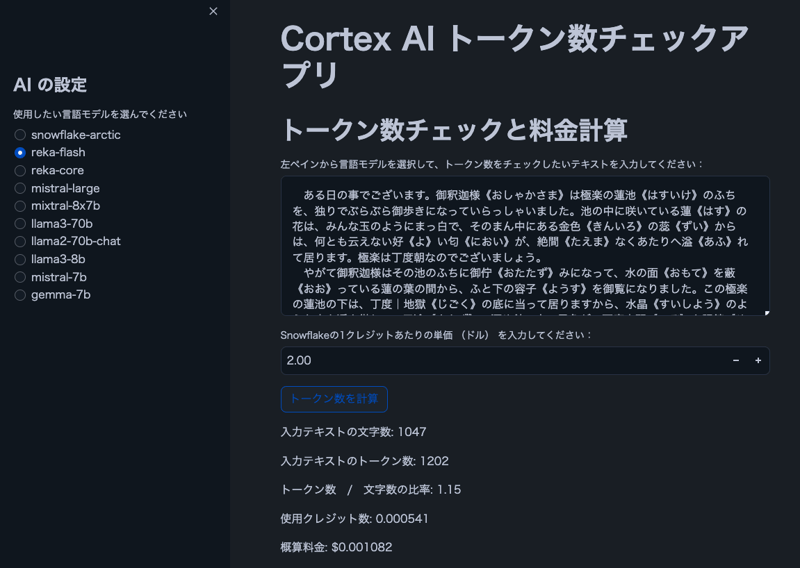I made a token count check app using Streamlit in Snowflake (SiS)
Introduction
Hello, I'm a Sales Engineer at Snowflake. I'd like to share some of my experiences and experiments with you through various posts. In this article, I'll show you how to create an app using Streamlit in Snowflake to check token counts and estimate costs for Cortex LLM.
Note: This post represents my personal views and not those of Snowflake.
What is Streamlit in Snowflake (SiS)?
Streamlit is a Python library that allows you to create web UIs with simple Python code, eliminating the need for HTML/CSS/JavaScript. You can see examples in the App Gallery.
Streamlit in Snowflake enables you to develop and run Streamlit web apps directly on Snowflake. It's easy to use with just a Snowflake account and great for integrating Snowflake table data into web apps.
About Streamlit in Snowflake (Official Snowflake Documentation)
What is Snowflake Cortex?
Snowflake Cortex is a suite of generative AI features in Snowflake. Cortex LLM allows you to call large language models running on Snowflake using simple functions in SQL or Python.
Large Language Model (LLM) Functions (Snowflake Cortex) (Official Snowflake Documentation)
Feature Overview
Image

Note: The text in the image is from "The Spider's Thread" by Ryunosuke Akutagawa.
Features
- Users can select a Cortex LLM model
- Display character and token counts for user-input text
- Show the ratio of tokens to characters
- Calculate estimated cost based on Snowflake credit pricing
Note: Cortex LLM pricing table (PDF)
Prerequisites
- Snowflake account with Cortex LLM access
- snowflake-ml-python 1.1.2 or later
Note: Cortex LLM region availability (Official Snowflake Documentation)
Source Code
import streamlit as st
from snowflake.snowpark.context import get_active_session
import snowflake.snowpark.functions as F
# Get current session
session = get_active_session()
# Application title
st.title("Cortex AI Token Count Checker")
# AI settings
st.sidebar.title("AI Settings")
lang_model = st.sidebar.radio("Select the language model you want to use",
("snowflake-arctic", "reka-core", "reka-flash",
"mistral-large2", "mistral-large", "mixtral-8x7b", "mistral-7b",
"llama3.1-405b", "llama3.1-70b", "llama3.1-8b",
"llama3-70b", "llama3-8b", "llama2-70b-chat",
"jamba-instruct", "gemma-7b")
)
# Function to count tokens (using Cortex's token counting function)
def count_tokens(model, text):
result = session.sql(f"SELECT SNOWFLAKE.CORTEX.COUNT_TOKENS('{model}', '{text}') as token_count").collect()
return result[0]['TOKEN_COUNT']
# Token count check and cost calculation
st.header("Token Count Check and Cost Calculation")
input_text = st.text_area("Select a language model from the left pane and enter the text you want to check for token count:", height=200)
# Let user input the price per credit
credit_price = st.number_input("Enter the price per Snowflake credit (in dollars):", min_value=0.0, value=2.0, step=0.01)
# Credits per 1M tokens for each model (as of 2024/8/30, mistral-large2 is not supported)
model_credits = {
"snowflake-arctic": 0.84,
"reka-core": 5.5,
"reka-flash": 0.45,
"mistral-large2": 1.95,
"mistral-large": 5.1,
"mixtral-8x7b": 0.22,
"mistral-7b": 0.12,
"llama3.1-405b": 3,
"llama3.1-70b": 1.21,
"llama3.1-8b": 0.19,
"llama3-70b": 1.21,
"llama3-8b": 0.19,
"llama2-70b-chat": 0.45,
"jamba-instruct": 0.83,
"gemma-7b": 0.12
}
if st.button("Calculate Token Count"):
if input_text:
# Calculate character count
char_count = len(input_text)
st.write(f"Character count of input text: {char_count}")
if lang_model in model_credits:
# Calculate token count
token_count = count_tokens(lang_model, input_text)
st.write(f"Token count of input text: {token_count}")
# Ratio of tokens to characters
ratio = token_count / char_count if char_count > 0 else 0
st.write(f"Token count / Character count ratio: {ratio:.2f}")
# Cost calculation
credits_used = (token_count / 1000000) * model_credits[lang_model]
cost = credits_used * credit_price
st.write(f"Credits used: {credits_used:.6f}")
st.write(f"Estimated cost: ${cost:.6f}")
else:
st.warning("The selected model is not supported by Snowflake's token counting feature.")
else:
st.warning("Please enter some text.")
Conclusion
This app makes it easier to estimate costs for LLM workloads, especially when dealing with languages like Japanese where there's often a gap between character count and token count. I hope you find it useful!
Announcements
Snowflake What's New Updates on X
I'm sharing Snowflake's What's New updates on X. Please feel free to follow if you're interested!
English Version
Snowflake What's New Bot (English Version)
https://x.com/snow_new_en
Japanese Version
Snowflake What's New Bot (Japanese Version)
https://x.com/snow_new_jp
Change History
(20240914) Initial post
Original Japanese Article
https://zenn.dev/tsubasa_tech/articles/4dd80c91508ec4
以上是I made a token count check app using Streamlit in Snowflake (SiS)的详细内容。更多信息请关注PHP中文网其他相关文章!

热AI工具

Undresser.AI Undress
人工智能驱动的应用程序,用于创建逼真的裸体照片

AI Clothes Remover
用于从照片中去除衣服的在线人工智能工具。

Undress AI Tool
免费脱衣服图片

Clothoff.io
AI脱衣机

Video Face Swap
使用我们完全免费的人工智能换脸工具轻松在任何视频中换脸!

热门文章

热工具

记事本++7.3.1
好用且免费的代码编辑器

SublimeText3汉化版
中文版,非常好用

禅工作室 13.0.1
功能强大的PHP集成开发环境

Dreamweaver CS6
视觉化网页开发工具

SublimeText3 Mac版
神级代码编辑软件(SublimeText3)
 Python与C:学习曲线和易用性
Apr 19, 2025 am 12:20 AM
Python与C:学习曲线和易用性
Apr 19, 2025 am 12:20 AM
Python更易学且易用,C 则更强大但复杂。1.Python语法简洁,适合初学者,动态类型和自动内存管理使其易用,但可能导致运行时错误。2.C 提供低级控制和高级特性,适合高性能应用,但学习门槛高,需手动管理内存和类型安全。
 Python和时间:充分利用您的学习时间
Apr 14, 2025 am 12:02 AM
Python和时间:充分利用您的学习时间
Apr 14, 2025 am 12:02 AM
要在有限的时间内最大化学习Python的效率,可以使用Python的datetime、time和schedule模块。1.datetime模块用于记录和规划学习时间。2.time模块帮助设置学习和休息时间。3.schedule模块自动化安排每周学习任务。
 Python vs.C:探索性能和效率
Apr 18, 2025 am 12:20 AM
Python vs.C:探索性能和效率
Apr 18, 2025 am 12:20 AM
Python在开发效率上优于C ,但C 在执行性能上更高。1.Python的简洁语法和丰富库提高开发效率。2.C 的编译型特性和硬件控制提升执行性能。选择时需根据项目需求权衡开发速度与执行效率。
 学习Python:2小时的每日学习是否足够?
Apr 18, 2025 am 12:22 AM
学习Python:2小时的每日学习是否足够?
Apr 18, 2025 am 12:22 AM
每天学习Python两个小时是否足够?这取决于你的目标和学习方法。1)制定清晰的学习计划,2)选择合适的学习资源和方法,3)动手实践和复习巩固,可以在这段时间内逐步掌握Python的基本知识和高级功能。
 Python标准库的哪一部分是:列表或数组?
Apr 27, 2025 am 12:03 AM
Python标准库的哪一部分是:列表或数组?
Apr 27, 2025 am 12:03 AM
pythonlistsarepartofthestAndArdLibrary,herilearRaysarenot.listsarebuilt-In,多功能,和Rused ForStoringCollections,而EasaraySaraySaraySaraysaraySaraySaraysaraySaraysarrayModuleandleandleandlesscommonlyusedDduetolimitedFunctionalityFunctionalityFunctionality。
 Python:自动化,脚本和任务管理
Apr 16, 2025 am 12:14 AM
Python:自动化,脚本和任务管理
Apr 16, 2025 am 12:14 AM
Python在自动化、脚本编写和任务管理中表现出色。1)自动化:通过标准库如os、shutil实现文件备份。2)脚本编写:使用psutil库监控系统资源。3)任务管理:利用schedule库调度任务。Python的易用性和丰富库支持使其在这些领域中成为首选工具。
 Python vs. C:了解关键差异
Apr 21, 2025 am 12:18 AM
Python vs. C:了解关键差异
Apr 21, 2025 am 12:18 AM
Python和C 各有优势,选择应基于项目需求。1)Python适合快速开发和数据处理,因其简洁语法和动态类型。2)C 适用于高性能和系统编程,因其静态类型和手动内存管理。
 Web开发的Python:关键应用程序
Apr 18, 2025 am 12:20 AM
Web开发的Python:关键应用程序
Apr 18, 2025 am 12:20 AM
Python在Web开发中的关键应用包括使用Django和Flask框架、API开发、数据分析与可视化、机器学习与AI、以及性能优化。1.Django和Flask框架:Django适合快速开发复杂应用,Flask适用于小型或高度自定义项目。2.API开发:使用Flask或DjangoRESTFramework构建RESTfulAPI。3.数据分析与可视化:利用Python处理数据并通过Web界面展示。4.机器学习与AI:Python用于构建智能Web应用。5.性能优化:通过异步编程、缓存和代码优






